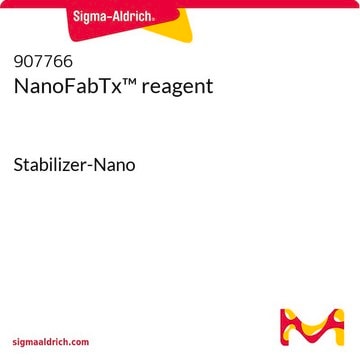917796
NanoFabTx™ PEG-PLGA drug formulation screening kit
for synthesis of PEGylated nanoparticles
Synonim(y):
NanoFabTx reagent kit, PEG-PLGA nanoparticles
About This Item
Polecane produkty
opis
Drug loading screening kit, for synthesis of PEGylated PLGA nanoparticles
Kit components :
PEGPLGA-50L(912808-500mg)
PEGPLGA-75L(913049-500mg)
PEGPLGA-50H (915955-500mg)
PEGPLGA-75H (915718-500mg)
Stabilizer-Nano (907766-5g)
Poziom jakości
Zastosowanie
advanced drug delivery
temp. przechowywania
2-8°C
Powiązane kategorie
Opis ogólny
- A Nanoprecipitation protocol to prepare drug-encapsulated nanoparticles in standard laboratory glassware.
- A Microfluidics protocol using commercial platforms or syringe pumps.
Zastosowanie
Cechy i korzyści
- Requires minimal laboratory setup
- Optimized protocols with step-by-step instructions for either nanoprecipitation or microfluidics-based synthesis
- Yields specifically sized, low polydispersity biodegradable, PEGylated PLGA nanoparticles from 50 nm to 350 nm in size
- Maximizes the encapsulation of hydrophobic drugs
- Four different PEGylated PLGAs are included
Informacje prawne
produkt powiązany
Kod klasy składowania
10 - Combustible liquids
Certyfikaty analizy (CoA)
Poszukaj Certyfikaty analizy (CoA), wpisując numer partii/serii produktów. Numery serii i partii można znaleźć na etykiecie produktu po słowach „seria” lub „partia”.
Masz już ten produkt?
Dokumenty związane z niedawno zakupionymi produktami zostały zamieszczone w Bibliotece dokumentów.
Produkty
NanoFabTx™ platform accelerates drug development with ready-to-use formulations and microfluidic devices for particle synthesis.
NanoFabTX kits enable precise drug delivery with lipid nanoparticles and liposomes for mRNA and nucleic acids.
Professor Robert K. Prud’homme introduces flash nanoprecipitation (FNP) for nanoparticle fabrication, which is a scalable, rapid mixing process for nanoparticle formulations.
Profesor Robert K. Prud'homme przedstawia nanoprecypitację błyskawiczną (FNP) do wytwarzania nanocząstek, która jest skalowalnym, szybkim procesem mieszania preparatów nanocząstek.
Nasz zespół naukowców ma doświadczenie we wszystkich obszarach badań, w tym w naukach przyrodniczych, materiałoznawstwie, syntezie chemicznej, chromatografii, analityce i wielu innych dziedzinach.
Skontaktuj się z zespołem ds. pomocy technicznej






